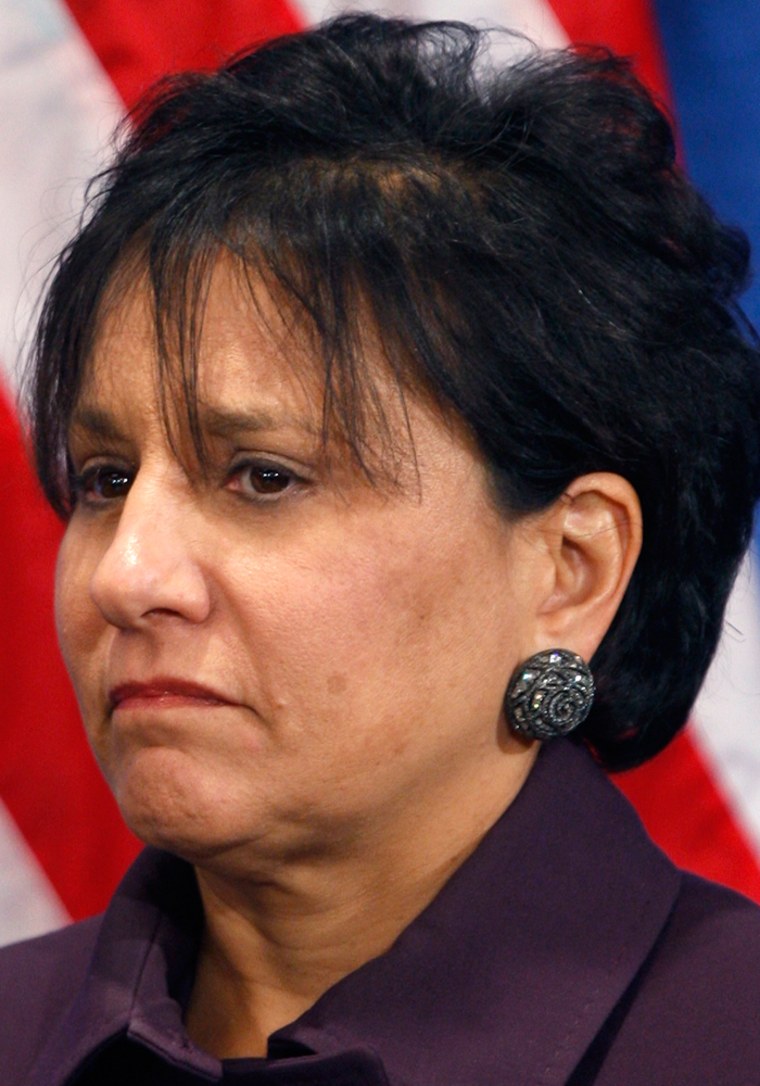When Barack Obama was looking for an entree into Chicago’s elite business community, he had the perfect door-opener: Penny S. Pritzker, a billionaire from one of the city’s dynasties.
Ms. Pritzker, 49, went on to become the Obama presidential campaign’s national finance chairwoman, raising record-breaking sums. And after Mr. Obama won the election, she was widely reported to be a leading contender for commerce secretary.
But the same business holdings and connections that made Ms. Pritzker so vital to Mr. Obama’s ability to raise campaign money also came under sharp scrutiny. On Thursday, she released a statement declaring that she would not be a candidate for the job.
“I think I can best serve our nation in my current capacity: building businesses, creating jobs and working to strengthen our economy,” Ms. Pritzker said. “It has been my great privilege to serve in the Obama campaign. I look forward to helping our new president in every way possible and am excited about the future under his leadership.”
Ms. Pritzker is one of three cousins who manage their family’s fortune, which includes Hyatt hotels, casinos and other ventures. She oversees a chain of luxury retirement communities, an airport parking company, a realty group and the credit-rating agency TransUnion.
The talk of a cabinet post, which would require Senate confirmation, had cast a spotlight on her secretive family’s empire and her past business dealings, including episodes that might prove politically embarrassing.
Earlier in her career, Ms. Pritzker was involved in running and overseeing Superior Bank, in a Chicago suburb, which focused on bundling subprime mortgages into securities, the practice that later helped set off the current financial crisis. The institution collapsed in 2001.
Moreover, Ms. Pritzker’s family is renowned for finding ways to avoid paying taxes on its wealth. The Pritzkers were pioneers in using tax loopholes to shelter their holdings from the Internal Revenue Service, and many of their dealings have never been made public.
It was not clear why she put out the statement on Thursday, but some news outlets, including The New York Times, reported late Wednesday night that she was in the final stages of being vetted. An Obama transition spokesman said Thursday that those accounts were incorrect.
Burt Ely, a banking consultant who testified at a 2001 Senate committee hearing about the failure of Superior Bank, said it had never made sense for Ms. Pritzker to become a nominee. “The confirmation hearing could have been quite ugly for all that would have been dredged up about Superior as well as possibly other Pritzker dealings,” Mr. Ely said Thursday.
In 1988, the Pritzker family and another wealthy investor took over a failing savings and loan and turned it into Superior Bank. Ms. Pritzker was its chairwoman from 1991 to 1994, after which she sat on the board of the bank’s holding company.
In 1993, the bank began a strategy of concentrating on packaging subprime mortgages into securities. At first, the bank flourished. But regulators later discovered accounting irregularities that overstated the value of its assets. The bank was forced to write down huge losses, leaving it without adequate capital in the spring of 2001.
In May 2001, Ms. Pritzker wrote a letter to bank employees assuring them that her family would put more cash in to save the bank, and declaring that “our commitment to subprime lending has never been stronger.” But the Pritzker family did not carry out the plan, and the bank was shut down in July 2001.
A 2002 report by the inspector general of the Federal Deposit Insurance Corporation concluded that “the failure of Superior Bank was directly attributable to bank management and the board of directors ignoring sound risk management principles and failing to adequately oversee Superior operations.”
The Pritzkers agreed in 2001 to pay the F.D.I.C. $460 million over 15 years to cover claims by depositors. Still, more than 1,400 depositors who had more than $100,000 in their savings accounts — the maximum the government then insured — were left short about $10 million, said Clint Krislov, a lawyer for several of them. “Why the Pritzkers wouldn’t do the right thing and just make these people whole for the small amount of money that it would take, I still cannot understand,” he said.
In a written response to questions by The Times on Thursday, Ms. Pritzker said, “I sincerely regret the closing of Superior Bank.” She said that she did not personally own any of the bank, but that her trusts had contributed to the “large amount of money” that her family paid to the F.D.I.C.
The Pritzker clan’s fortune traces back to a Chicago law firm run by Ms. Pritzker’s grandfather, who bought up property during the Depression and became an investor. His sons expanded the empire, establishing the Hyatt chain.
The family also increased its wealth by exploiting loopholes in the tax code, including setting up a series of offshore trusts that sheltered their assets from taxes.
The I.R.S. fought several battles with the Pritzkers over the arrangements. But the agency was hindered by foreign bank secrecy laws that concealed what the Pritzkers owned.
In 2002, a few cracks appeared in the wall of secrecy when two young Pritzker heirs filed a lawsuit claiming their older relatives had looted their trusts. The litigation revealed that the family was worth at least $15 billion, that it was held in some 950 trusts, and that they were trying to split it up among 11 heirs by 2011.
One Democrat familiar with the transition said Thursday that Ms. Pritzker initially believed she could weather questions about Superior Bank, but her family resisted because their assets are so entangled.
The transition team’s vetting form, which she never filled out, required disclosing all property owned in the past decade, including “held in trust” or “held in combination with others.”
Jeff Zeleny contributed reporting.
This article, , first appeared in The New York Times.
